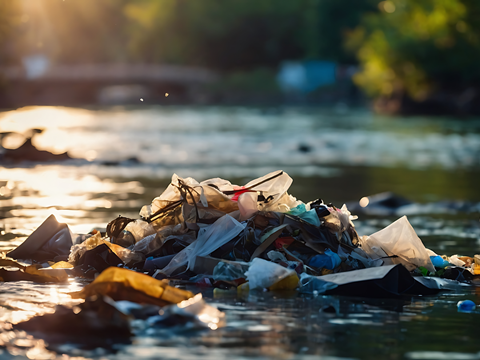
WWF commends the High Ambition Coalition to End Plastic Pollution (HAC)’s INC-5 Ministerial Statement – which pushes for an ‘ambitious and effective’ treaty with legally binding, global rules to end plastic pollution by 2040 – and states that it will hold the Coalition to these commitments at INC-5 in November.
The HAC consists of over 60 countries, including Japan, Australia, Rwanda, Kenya, and several members of the European Union. It makes up a majority of plastic consumption across the world, according to WWF.
These countries have committed to implementing legally-binding measures – including a reduction in plastic production and consumption, a phase-out for ‘problematic’ plastic products and chemicals, and the implementation of a global, non-toxic circular economy – and aim to end plastic pollution by 2040.
Eirik Lindebjerg, global plastics policy lead at WWF International, commented: “The HAC’s commitments inject much-needed energy and hope into the final stretch of these negotiations, which have, for the most part, been undermined by opposition from petrochemical lobbyists and a few oil-dependent countries undeterred by the damage that business-as-usual would inflict.
“Along with statements from many other governments, these commitments are proof that a global majority of countries want legally binding measures. Countries must now make these rules reality and not let vested interests water down the treaty.”
Previously, WWF’s ‘Must-Haves’ paper urged countries to endorse four binding global measures across the plastic lifecycle – global bans and phase-outs of harmful and ‘problematic’ plastic products and chemicals; global product design requirements to ensure the safety and reusability or recyclability of plastics; aligning financial flows and resources to ensure a just transition for all countries; and a future-proof treaty containing mechanisms to guarantee strengthening over time.
Now Nordic Ministers have signed a treaty advocating for a global ban on intentionally added microplastics, as well as product design requirements that minimize the use of microplastics.
Meanwhile, the Business Coalition for a Global Plastics Treaty consists of over 200 businesses supporting the creation of an ambitious, effective global treaty to bring an end to plastic pollution.
A survey commissioned by WWF also indicated that 85% of consumers support a ban on ‘unnecessary, avoidable, and harmful’ single-use plastics, while 90% back a ban on hazardous chemicals used in plastics.
Now WWF encourages all countries to present their commitments and advocate for binding global rules across the full plastic life cycle.
“In the 60 days from now till INC-5, nearly two million more tonnes of plastic will pour into our ocean,” Lindebjerg warns. “Businesses, scientists, civil society organizations and citizens worldwide have made clear that the only way out of this man-made crisis is through an ambitious and legally-binding global treaty – at INC-5, our governments have the chance to show that they too stand with the majority of the world’s population, and not against us.
“Countries that are committed to ending plastic pollution must be prepared to act boldly and come to INC-5 prepared to vote in favour of all four measures. Should INC-5 conclude with a weak voluntary treaty, HAC countries must instead pursue the global treaty they promised through other forums.
“A treaty with binding measures supported by the majority of countries will be more effective than a voluntary-based treaty supported by all countries. The plastic pollution crisis is a global problem that demands a global solution. We must move beyond the voluntary mindset that has so far dominated our collective response.”
At the end of INC-4, we spoke to Erin Simon, vice president and head of Plastic Waste and Business at WWF. Although she commended “the majority of countries” for seeking global alignment on a prospective treaty; she also approved of their intent to tackle ‘problematic’ and avoidable plastics and chemicals of concern, and the push to develop design standards for easily reusable or recyclable products.
However, she noted that some countries still sought to manage the treaty on a national level, and felt that the reduction of primary plastic polymers should have been included in the draft text.
“To the negotiators – you put differences aside and got to work, there’s still a long way to go and this process will only get harder because of some of the key measures that were excluded,” she said. “Making history in Busan later this year will fully depend on your ability to move forward and not let the voices of a few dim the mission of the majority.”
WWF as a whole stated that INC-4 ‘yielded some success’ in combating the plastic waste crisis, but felt that negotiations ‘moved at too slow a pace’ to match current pollution levels. It warned that over 15 million tonnes of plastic had leaked into the ocean since negotiations began, and that negotiators are falling behind on the scale and speed needed to tackle this rate of pollution.
If you liked this story, you might also enjoy:
The ultimate guide to the Packaging and Packaging Waste Regulation in 2024
How are the top brands progressing on packaging sustainability?
Sustainable Innovation Report 2024: Current trends and future priorities
Everything you need to know about global plastic sustainability regulation














No comments yet